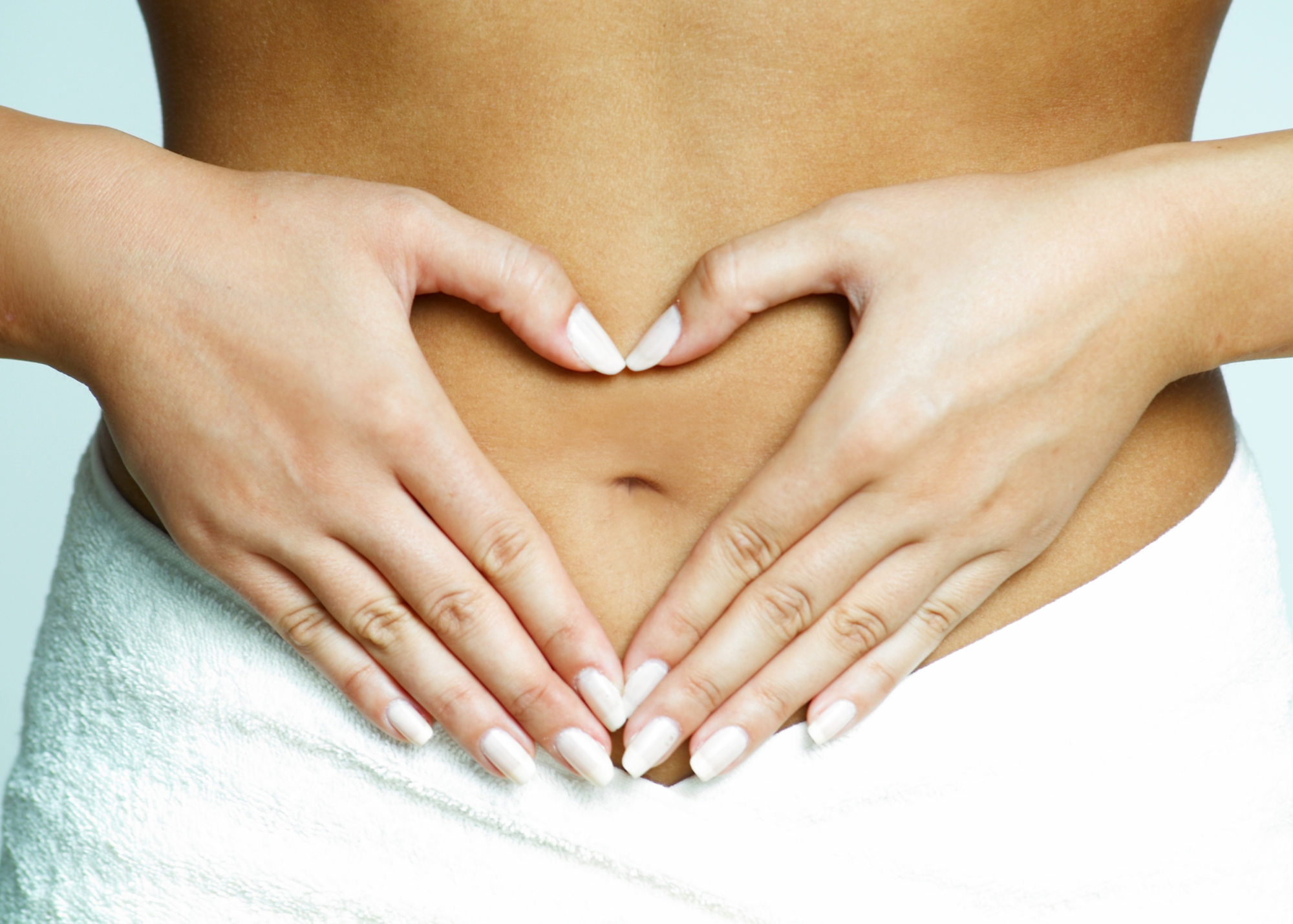Share
In this Article
Key Takeaways
| Topic | Summary |
|---|---|
| Stress-Fertility Connection | Chronic stress disrupts hormonal balance, reduces blood flow to reproductive organs, and can lead to ovulation disruption. Manage stress through relaxation techniques, regular exercise, and consider professional support. |
| Acupuncture Benefits for Fertility | Acupuncture regulates the nervous system, reduces cortisol levels, and improves sleep quality. Aim for regular sessions (1-2 times per week) for at least 3 months to see potential benefits. |
| Hormonal Balance and Menstrual Regulation | Acupuncture can help regulate the menstrual cycle and improve hormonal balance. Track your cycle and symptoms, and discuss any irregularities with your acupuncturist for targeted treatment. |
| Acupuncture for Male Fertility | Men can benefit from acupuncture to improve sperm quality and reduce stress. Encourage male partners to consider acupuncture treatments, especially if facing male factor infertility. |
| Integrating Acupuncture into Fertility Treatment | Combine acupuncture with lifestyle changes like a balanced diet and regular exercise. Inform your fertility doctor about acupuncture treatments to ensure a coordinated approach. |
| Recommended Service and Product | |
Traditional Acupuncture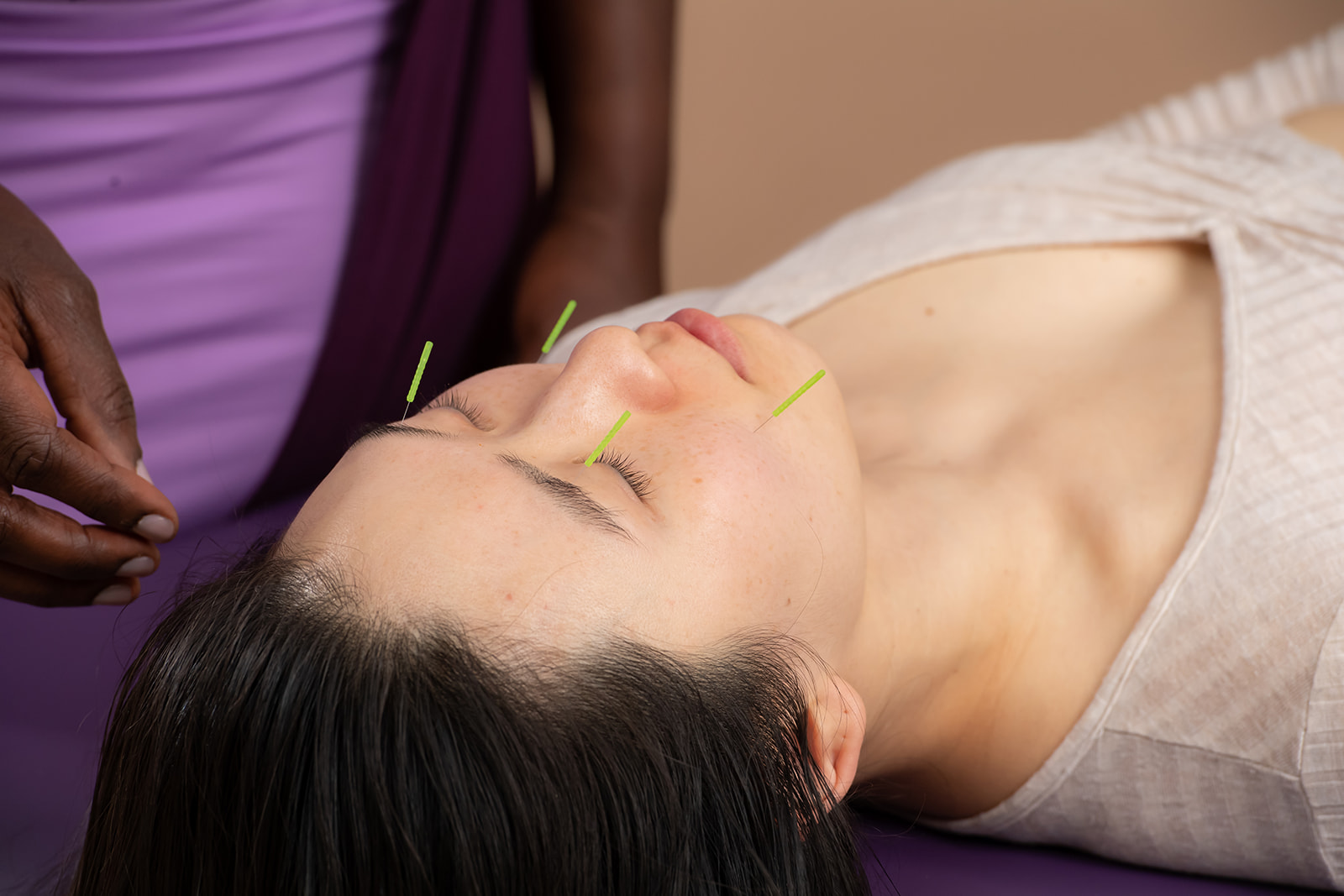 |
Our Traditional Acupuncture service offers a holistic approach to fertility support, addressing both physical and emotional aspects of conception. Regular sessions can help reduce stress, balance hormones, and improve overall reproductive health. Book an Appointment |
Recovery Body Treatment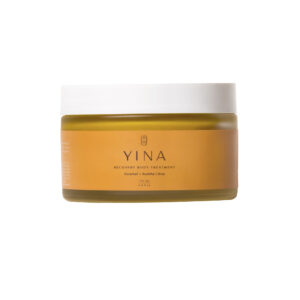 |
Our Recovery Body Treatment uses Horsetail and Buddha Citrus to improve circulation and promote relaxation, supporting reproductive health. Apply daily after showering for best results. Buy Now |
In my previous article, titled “Age and Fertility: Navigating Challenges and Opportunities”, we addressed issues of the relationship between age and fertility, including how it is possible to conceive at an older age and the difficulties that arise in trying to do so. In this respect, we would like to highlight another area in the field of fertility support which has been of great interest recently: acupuncture for relaxation and improving chances of conception.
The connection between acupuncture and fertility has been strengthening in the section of the reproductive health. This is an age-old practice which is an element of Traditional Chinese Medicine (TCM), and it provides a more all encompassing approach to conception since it deals with both mental and physical state of the patient. As you will see, stress relief is the primary reason for the use of acupuncture in the treatment of infertility rather than the clinical applications of it.

Get expert tips on healthy living and aging gracefully at 40 and beyond from me.
Success! Now check your email to confirm your subscription.
Understanding the Stress-Fertility Connection
However, stress management intervention using acupuncture has its fair share of detractors that needs every patient to be aware of. First of all, let me emphasise that infertility is one of the chronic and silent disorders that women do not like to discuss where stress is commonly overlooked. During my years’ of practice, I have witnessed many women who are trying to get pregnant suffering emotionally in the process but do not realize how great an impact stress has on their reproduction.
The Physiological Impact of Stress on Fertility
Stress isn’t just a mental state; it has very real physiological effects on our bodies. When we’re stressed, our bodies release cortisol, often called the “stress hormone.” High levels of cortisol can wreak havoc on our reproductive system:
- Hormonal Imbalance: Stress can disrupt the delicate balance of hormones necessary for ovulation and implantation. It can interfere with the production of gonadotropin-releasing hormone (GnRH), which is essential for regulating the menstrual cycle.
- Reduced Blood Flow: Chronic stress can lead to constricted blood vessels, reducing blood flow to the reproductive organs. This can affect the quality of eggs and the thickness of the uterine lining.
- Ovulation Disruption: In some cases, severe stress can even prevent ovulation altogether, a condition known as stress-induced anovulation.
- Lowered Libido: Let’s face it, when you’re stressed, sex is often the last thing on your mind. This can lead to less frequent intercourse, reducing the chances of conception.

The Emotional Toll of Infertility
The relationship between stress and fertility is a vicious cycle. Struggling to conceive is inherently stressful, and that stress, in turn, can make conception even more challenging. Many of my clients report feeling anxious, depressed, and even isolated during their fertility journey. These emotional states aren’t just unpleasant; they can have tangible effects on fertility:
- Altered Behavior: Stress and anxiety can lead to unhealthy coping mechanisms like overeating, undereating, excessive alcohol consumption, or smoking – all of which can negatively impact fertility.
- Sleep Disturbances: Stress often leads to poor sleep quality, which can affect hormone production and overall health.
- Relationship Strain: The pressure to conceive can put a significant strain on relationships, potentially leading to less frequent intercourse and increased stress levels for both partners.
How Acupuncture Can Help: A Holistic Approach to Fertility
Now as we have made the connection between stress and fertility, let’s see how acupuncture can come to play in this game. Acupuncture is one of the few methods in the world that enhances the chances of conception with a full-body treatment.
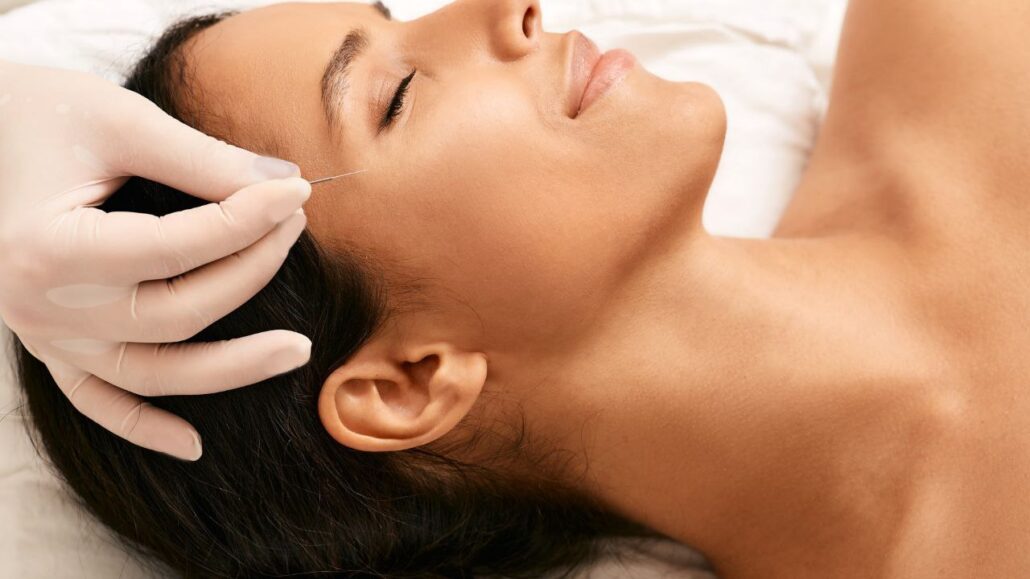
Stress Reduction Through Acupuncture
One of the primary benefits of acupuncture in fertility treatment is its powerful stress-reducing effects. Here’s how it works:
- Nervous System Regulation: Acupuncture has been shown to activate the parasympathetic nervous system, our body’s “rest and digest” mode. This helps counteract the effects of chronic stress and promotes a state of relaxation.
- Endorphin Release: The insertion of acupuncture needles stimulates the release of endorphins, our body’s natural feel-good chemicals. This can help alleviate anxiety and promote a sense of well-being.
- Cortisol Reduction: Regular acupuncture treatments have been associated with lower cortisol levels, helping to mitigate the negative effects of this stress hormone on fertility.
- Improved Sleep Quality: Many of my clients report better sleep after starting acupuncture treatments. Better sleep means better hormone regulation and overall health.
Balancing Hormones and Regulating Menstrual Cycles
Beyond stress reduction, acupuncture can have direct effects on the reproductive system:
- Hormonal Balance: Acupuncture can help regulate the hypothalamic-pituitary-ovarian axis, which is crucial for hormone balance and regular ovulation.
- Menstrual Regulation: For women with irregular cycles, acupuncture can help promote more regular periods, potentially increasing the chances of conception.
- Improved Egg Quality: Some studies suggest that acupuncture may improve blood flow to the ovaries, potentially enhancing egg quality.
Supporting Assisted Reproductive Technologies
For women undergoing fertility treatments like IVF or IUI, acupuncture can be a valuable complementary therapy:
- Increased IVF Success Rates: Some studies have shown improved IVF success rates when acupuncture is used in conjunction with standard treatments.
- Reduced Side Effects: Acupuncture may help alleviate some of the side effects associated with fertility medications, such as bloating and mood swings.
- Emotional Support: The regular, nurturing touch involved in acupuncture treatments can provide emotional support during the often stressful process of fertility treatments.
Acupuncture for Male Fertility
It’s important to note that fertility isn’t just a women’s issue. Male factor infertility accounts for up to 50% of infertility cases. Acupuncture can be beneficial for men too:
- Improved Sperm Quality: Some studies suggest that acupuncture may improve sperm count, motility, and morphology.
- Stress Reduction: Just like in women, stress can affect male fertility. Acupuncture’s stress-reducing effects can be beneficial for men as well.
- Hormonal Balance: Acupuncture may help balance male hormones, potentially improving fertility.
Integrating Acupuncture into Your Fertility Journey
If you’re considering adding acupuncture to your fertility toolkit, here are some tips to get started:
- Find a Qualified Practitioner: Look for a licensed acupuncturist with experience in fertility treatments. At CARRINNA, we offer specialized acupuncture services tailored to fertility support.
- Consistency is Key: Acupuncture isn’t a quick fix. Regular treatments over several months are typically recommended for optimal results.
- Combine with Other Lifestyle Changes: Acupuncture works best when combined with other healthy lifestyle habits like a balanced diet, regular exercise, and stress management techniques.
- Communicate with Your Healthcare Team: If you’re undergoing fertility treatments, make sure to inform your doctor about your acupuncture treatments to ensure a coordinated approach.
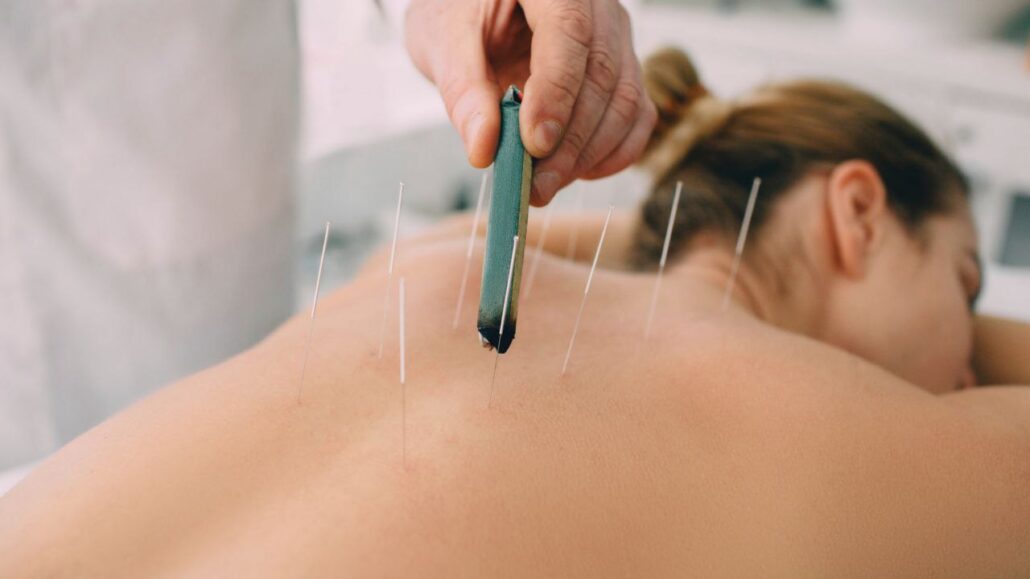
Our Holistic Approach at CARRINNA
At CARRINNA, we adopt an integrated perspective towards female reproductive health including increasing the chances of conception. In our Fertility & Women’s health Pack, the supportive therapies are combined with acupuncture to give a complete package. Such a package targets females with hormonal imbalance, infertility, and menopausal issues.
In addition to acupuncture, we offer a range of products that can support your fertility journey:
- Regenerate Serum: This serum contains Reishi and Centella, known for their rejuvenating properties. While primarily used for skin health, these ingredients also have potential benefits for overall wellness, which can indirectly support fertility.
- Essential Mist: Our Essential Mist combines prebiotics and Tremella to combat stress and fatigue. Stress reduction is crucial for fertility, making this a great addition to your daily routine.
- Recovery Body Treatment: This treatment uses a blend of Horsetail and Buddha Citrus to improve circulation and promote relaxation, both of which can be beneficial for reproductive health.
Remember, while these products can be supportive, they should be used in conjunction with professional medical advice and treatment for fertility issues.
FAQ
Acupuncture supports fertility by addressing both physical and emotional aspects of conception. It helps balance hormones, regulate menstrual cycles, improve blood flow to reproductive organs, and reduce stress. By inserting thin needles at specific points, acupuncture can stimulate the body’s natural healing processes, potentially improving overall reproductive health and increasing the chances of successful conception.
Yes, acupuncture may improve the chances of natural conception. It works by enhancing the body’s reproductive function, reducing stress, and promoting overall well-being. While more research is needed, many couples have reported success in conceiving naturally after incorporating acupuncture into their fertility journey. However, it’s important to remember that acupuncture should be used as part of a comprehensive approach to fertility, including a healthy lifestyle and proper medical care.
The best time to start acupuncture for fertility is ideally three to four months before trying to conceive. This allows enough time for acupuncture to regulate your menstrual cycle, balance hormones, and reduce stress levels. If you’re already trying to conceive or undergoing fertility treatments, it’s never too late to start. Acupuncture can be beneficial at any stage of your fertility journey, but consistency is key for optimal results.
Acupuncture reduces stress, which is crucial for fertility, in several ways:
- It stimulates the release of endorphins, the body’s natural feel-good chemicals.
- It activates the parasympathetic nervous system, promoting relaxation.
- It helps lower cortisol levels, the primary stress hormone.
- It improves sleep quality, which is essential for hormonal balance.
By reducing stress, acupuncture creates a more favorable environment for conception by balancing hormones and improving overall reproductive health.
Yes, acupuncture is generally considered safe during pregnancy when performed by a qualified practitioner experienced in treating pregnant women. However, certain acupuncture points should be avoided during pregnancy as they may stimulate labor. Always inform your acupuncturist if you’re pregnant or trying to conceive, and consult with your healthcare provider before starting any new treatments during pregnancy.
The frequency of acupuncture treatments for fertility can vary depending on individual needs and circumstances. Generally, it’s recommended to have treatments once or twice a week for at least three months. This allows time for the cumulative effects of acupuncture to build up and positively impact your reproductive health. As you progress in your fertility journey, your acupuncturist may adjust the frequency of treatments based on your response and specific fertility goals.
Conclusion
Quite a number of women go through a roller coaster when trying to get pregnant; it is a process full of ups and downs. When it comes to fertility, acupuncture is quite effective although it is not a cure all. The initial treatment goal is to lower stress levels, stabilize hormones, and enhance general psychological health that will be an assist to fertility amongst many other things.
At CARRINNA, we’re committed to supporting you on this journey. Whether you’re just starting to think about conceiving or you’ve been on this path for a while, we’re here to offer guidance, support, and holistic treatments tailored to your unique needs.
Remember, every woman’s fertility journey is unique. What works for one person may not work for another. It’s important to work with healthcare professionals to develop a personalized plan that addresses your specific needs and circumstances. Acupuncture, when used as part of a comprehensive approach to fertility, can offer hope and potentially improve outcomes for many women and couples struggling with infertility.
In this particular section of our understanding of fertility, let us remember to take care of ourselves and admit that sometimes some compassion is necessary and encase the bodies and minds with understanding in a gentle way and this long journey requires time and much more optimism than impatience. Because, parenthood is not just a destination but rather a long journey of developing who we are and achievement towards where we intend to go.




